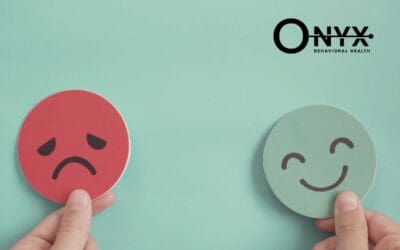Depression & Depressive Disorders

Depression. It’s a loaded word. One that someone may use colloquially to express a moment of sadness, or they may use other words to describe what they are experiencing. That being said, it should be no surprise that depression can be caused by a wide array of experiences and it can be felt in many ways.
However, it is important to understand that the way you are feeling will not last forever. Let’s talk about what depression is and when you should contact our team at Onxy Behavioral Health for help.
21 million (8.3 %) of U.S. adults had at least one major depressive episode in the past year
%
18.6 of individuals aged 18-25 experienced a major depressive episode in the past year
What is Depression?
Often described as a feeling of sadness, depression is actually tied to physiological changes. According to an article published in World Psychology, “the underlying pathophysiological basis of depression is a depletion of the neurotransmitters serotonin, norepinephrine or dopamine in the central nervous system.” There is a particularly clear connection between low serotonin levels – a neurotransmitter responsible for mood regulation – and depression. So, one may infer that depression is a symptom of low serotonin levels.
The million dollar question is why would someone’s serotonin levels drop and how can we bring them back up?
Risk Factors
Preventing and identifying cases of depression is easier when we know who is more likely to experience this condition. Possible risk factors include:
- Traumatic childhood experiences
- Family history of mood disorders
- Stressful life circumstances (Marital issues, relationship changes, financial struggles, etc.)
- Traumatic brain injuries
- Previous diagnosis of other certain medical conditions (ie: history of sleep disturbances, medical illness, chronic pain, ADHD)
- Co-occuring substance use disorder
While these risk factors can indicate those who are more likely to have a depressive episode, this doesn’t mean people without risk factors are immune. Ultimately, knowing the symptoms of a depressive episode will ensure someone who is already experiencing depression can get help.
Depression Symptoms
Feeling sad or “low”
Loss of interest or pleasure in activities previously enjoyed
Changes in appetite — loss of appetite or over eating
Changes in sleep — trouble sleeping or trouble waking up
Excessive fatigue
Slowed movements and speech
Feeling of worthless, helplessness or guilty
Poor concentration or difficult making decisions
Thoughts of death or suicide
Types of Depression
Depression can manifest in various ways. It can be a temporary experience (acute) triggered by specific circumstances, or it can become a chronic, ongoing condition. Since depression affects everyone differently, we categorize it into different types based on its severity, duration, and potential causes. While feelings of sadness, loss of interest, and changes in sleep or appetite are common symptoms, the overall experience of depression can vary greatly. As such, we categorize depression in the following ways:
Major Depression
Multiple symptoms of depression that interfere with daily activities and last for 2 or more weeks.
Persistent Depressive Disorder
Less severe depressive syptoms, but that last for extended periods of time (potentially years).
Postpartum Depression
Depression that presents following childbirth (during the postpartum period) a common but treatable condition affecting up to 1 in 7 women. Also known as “baby blues,” the symptoms make it difficult to bond with your newborn baby and enjoy motherhood.
Seasonal Affective Disorder (SAD)
Cyclical depressive episodes that tend to be associated with a particular time of the year. Most commonly seasonal affective disorder presents during late spring and lasts through the winter. SAD is more common in parts of the year that have longer winters and shorter days during the winter.
Untreated Effects of Depression Can Be Serious
Depression is more than just feeling down for a few days. It’s a real medical condition that, if left untreated, can have a significant impact on your physical and mental well-being. Chronic depression can weaken your immune system, making you more susceptible to illnesses. It can also contribute to heart disease, stroke, and other health problems. Depression can negatively affect relationships with loved ones due to withdrawal, irritability, or mood changes. Some individuals may turn to alcohol or drugs to cope with the symptoms of depression, leading to addiction and further complications. In the most severe cases, untreated depression can significantly increase the risk of suicidal thoughts and behaviors.Frequently Asked Questions on Depression
Is depression a real illness?
Yes. Depression is a diagnosable, clinical mental health condition with evidence-based treatments available.
Is there a difference between sadness and depression?
Yes. Sadness is a normal human emotion that we experience from time to time. However, it is typically short-lived and does not significantly impact daily activities.
Depression is when persistent, severe sadness does not go away and does have an impact on daily acitvities.
Are there lifestyle changes that can help manage depression?
Lifestyle changes can certainly have an impact on mental health. The most significant changes that have been shown to help depression include regular exercise, healthy eating, and clean sleep hygiene.
Overcoming Depression at Onyx
Depression is one of the most common mental health conditions Americans struggle with. Yet, depression isn’t a one-size-fits-all condition. If left untreated, depression can change the entire trajectory of one’s life – but it is a treatable condition. If you’re experiencing symptoms interfering with your daily life, seeking professional support is essential.
At Onyx Behavioral Health, we help people like you get their depression under control and get their lives back. We do this with individual treatment plans that may include a combination of medication, talk therapy, and lifestyle changes. With the right help, you can return to being your best version and feel good again! So get started today by calling us at 888-242-5716.
Discover Healing with Onyx Behavioral Health
Related Articles
How To Help And Support Someone Who Attempted Suicide
The aftermath of a suicide attempt can be a tumultuous period filled with fear, confusion, and intense emotions for both the individual and their loved ones. Supporting someone who has attempted suicide requires a deep understanding of their emotional and...
Finding Hope Through the Fog: Navigating Treatment-Resistant Depression
Treatment-resistant depression (TRD) is when someone’s depression doesn’t get better, even after trying different treatments like medications or therapy. At least 30% of those with depression meet this definition, meaning that a significant number of people don’t find...
9 Signs of Emotional Trauma in Adults
Emotional trauma affects an astonishing 70% of U.S. adults having experienced at least one traumatic event in their lives. It originates from profoundly distressing or life-altering events that shatter a person's sense of security, leading to feelings of helplessness...




 Michaela Welk, LMHC
Michaela Welk, LMHC Bunny Berman
Bunny Berman Tank
Tank Richard E. LoSardo, MD
Richard E. LoSardo, MD
 Christopher Payne
Christopher Payne Bernard Benjamin
Bernard Benjamin Tiffany Bellino
Tiffany Bellino